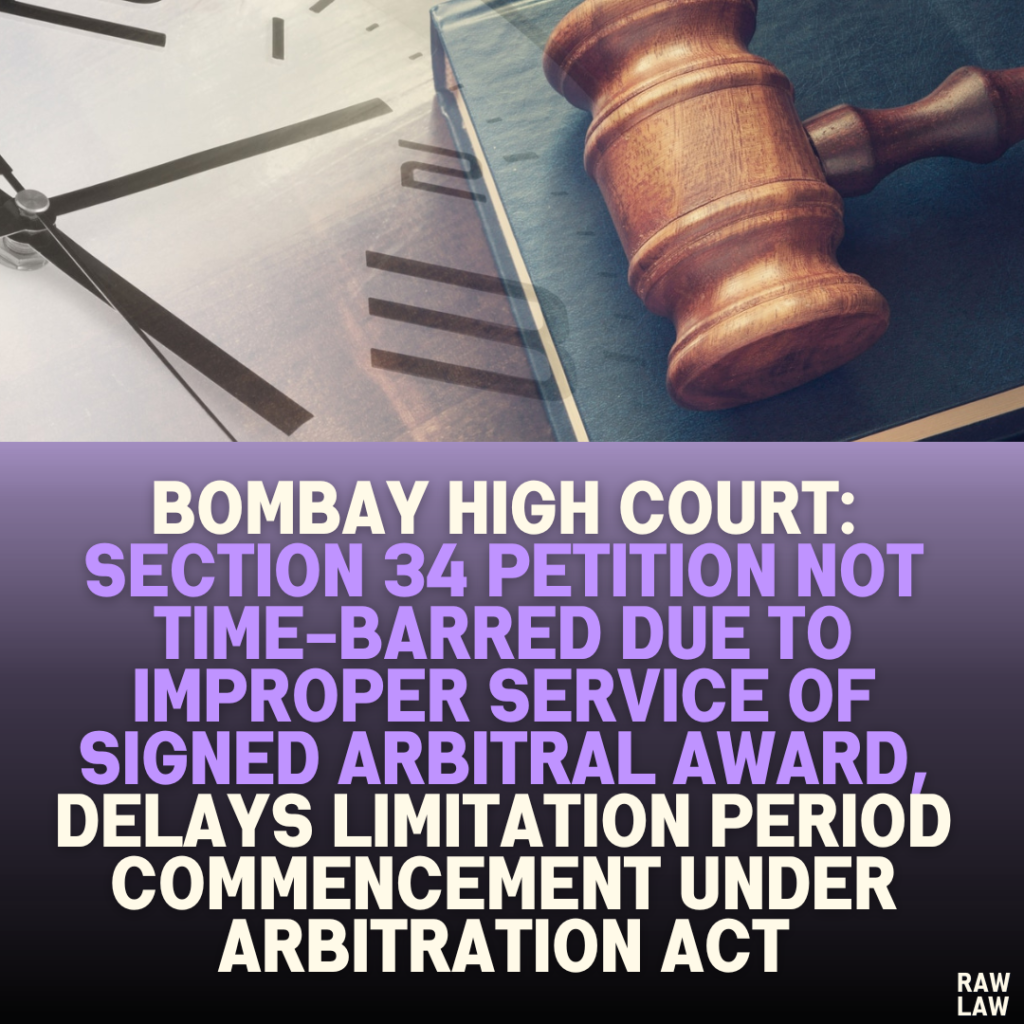1. Court’s Decision
The Bombay High Court reversed the Single Judge’s decision and held that the Arbitration Petition filed under Section 34 was not time-barred. The court ruled that:
- The signed arbitral award was not properly served on all the parties to the arbitration.
- The limitation period started only when the arbitrator denied the appellants’ request for a certified copy in August 2023.
- The Section 34 petition was filed within the allowable time from this date.
2. Facts of the Case
- Parties Involved: The case involved a proprietary firm (the claimant) and a partnership firm with three partners (the appellants).
- The Dispute: The dispute arose from a business arrangement containing an arbitration clause. The claimant initiated arbitration due to disagreements.
- The Award: The arbitrator issued an ex-parte award on July 1, 2017, in favor of the claimant.
- Service of Award: The arbitrator prepared only two signed copies of the award—one for the claimant and one for the partnership firm. These copies were sent by registered post.
- Appellants’ Claim:
- The appellants argued they did not receive the signed award as required under Section 31(5) of the Act.
- They also stated that the acknowledgment of receipt was signed by a clerk (Mr. Shivaji Govind Botekar), who was not authorized to accept the award on their behalf.
- Attempt to Obtain Certified Copy:
- In April 2023, the appellants sought documents related to the arbitration in execution proceedings.
- In August 2023, the arbitrator denied their request for a certified copy of the award.
- Filing of Petition: Based on the refusal, the appellants filed their Section 34 petition on September 7, 2023, claiming the limitation period commenced in August 2023.
3. Issues
- Whether the delivery of the signed arbitral award to an employee (Mr. Botekar) constituted valid service under Section 31(5).
- Whether the delay in filing the Section 34 petition could be condoned under the Act.
4. Petitioner’s Arguments
- Improper Service: The petitioners argued that they had not been served a signed copy of the award as mandated under Section 31(5).
- Unauthorized Receipt: They claimed that the acknowledgment signed by Mr. Botekar, a clerk, did not constitute valid service since he was not authorized to receive the award.
- Commencement of Limitation: They contended that the limitation period began only after the arbitrator refused their request for a certified copy in August 2023.
5. Respondent’s Arguments
- Proper Service: The respondents claimed that the award was duly served on the appellants through registered post, and the acknowledgment signed by the clerk was valid.
- Limitation Period: They argued that the petition was filed beyond the three-month period allowed under Section 34(3) and the extended period of thirty days under its proviso.
6. Analysis of the Law
- Mandatory Service Under Section 31(5):
Section 31(5) of the Act mandates the delivery of a signed copy of the arbitral award to each party involved in the proceedings. The term “party” is defined in Section 2(1)(h) as a person directly involved in the arbitration agreement, not their agents or employees. - Commencement of Limitation Under Section 34(3):
The limitation period of three months to challenge an arbitral award begins only when a signed copy is delivered to the party. The Delhi High Court in Ministry of Health & Family Welfare v. Hosmac Projects held that delivery to an agent or employee does not suffice. - Precedents Applied:
- Tecco Trichy Engineers v. Union of India: The Supreme Court held that delivery of the signed award is essential for the limitation period to commence.
- Benarsi Krishna Committee v. Karmyogi Shelters Pvt. Ltd.: Service on an agent or advocate does not fulfill the requirement of delivery under Section 31(5).
- Ark Builders Pvt. Ltd. v. State of Maharashtra: Limitation begins only upon proper delivery of a signed award.
7. Court’s Reasoning
- Improper Service:
- The court found that the acknowledgment signed by Mr. Botekar, a clerk, did not constitute valid service under the Act. Service must be made directly to the party, as per the statutory mandate.
- The arbitrator failed to prepare and deliver a signed copy of the award to all five parties in the arbitration. Instead, only two signed copies were prepared.
- Commencement of Limitation:
- As the signed award was not properly delivered, the limitation period did not commence in July 2017. It began only in August 2023 when the arbitrator refused to provide a certified copy of the award.
- Single Judge’s Error:
- The learned Single Judge erroneously relied on deemed service principles under the General Clauses Act, which are inapplicable to arbitration proceedings governed by the Act.
8. Conclusion
The court set aside the Single Judge’s order and held that:
- The Section 34 petition was filed within the limitation period, starting from August 2023.
- The matter was remanded for adjudication on merits.
9. Implications
This judgment emphasizes the importance of strict compliance with procedural requirements under the Arbitration and Conciliation Act. The ruling protects parties from being unfairly deprived of their right to challenge an award due to procedural lapses in service.



